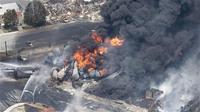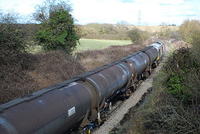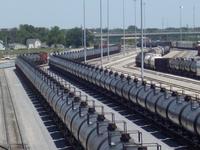-
Designing the future of rail travel
Increased traffic, congestion, security of energy supply, and climate change are just some of the many pressing issues that the EU currently faces. In order fully to tackle these challenges, the railway sector must modernize and take on a larger share of transport demand over the next few decades. EU-funded researchers have just begun work on three exciting projects that could very well determine the shape of rail travel in the coming years.
-
-
Strengthening increasingly unstable rail tracks
The big chunks of rock — crushed limestone or dolomite that engineers call ballast — which keep railroad tracks in place look like a solid footing even as freight cars rumble overhead. Temperature and vibration, however, can destabilize ballast over time, keeping it from safely transferring the weight of a loaded train to the soil below, draining water, and preventing vegetation from crowding the tracks. In some states, a booming industry of mining sand for use by oil and gas drillers in hydraulic fracturing has presented a new challenge: fine grains of sand can leak from rail cars, accumulate in rail bed ballast and, during a rainstorm, turn into mushy, track-loosening mud.
-
-
Crumbling infrastructure to blame for growing number of derailments: Experts
Transportation industry analysts say the increase in the number of derailments is due to a crumbling transportation infrastructure and a lack of interest in funding rail transportation. Amtrak, a federally subsidized for-profit corporation, has been the target of conservative legislators who want to cut government spending. “The problem that you have — and you’ve had it since 1976 and even before — is that there’s never been an investment program that would bring the infrastructure up where it belongs on existing capacity,” says Amtrak CEO. While derailments are usually due to equipment failures, human and environmental factors can contribute to train accidents.
-
-
New safety rules for crude oil shipments by rail criticized by both sides
Regulators with the Department of Transportation(DOT) last Friday unveiled new rules for transporting crude oil by rail. The measures are expected to improve rail safety and reduce the risk of oil train accidents, but both the railway industry and public safety advocates have already issued criticism. Lawmakers representing states with oil trains traffic say the regulations do not go far enough in protecting the public, while railway representatives say the rules would be costly and result in few safety benefits.
-
-
437,000 crude oil barrels carried daily by rail from North Dakota to East Coast refineries
In the wake of recent oil train derailments in West Virginia, and Galena, Illinois, the federal government has answered calls to release oil train figures. The U.S. Energy Information Administration, taking numbers from industry and government, report that more than one million barrels of crude oil move by train across the United States every day.Federal crude-by-rail information reveals that 437,000 barrels of Bakken crude oil were shipped daily in January from North Dakota to East Coast refineries. Those shipments passed through the Chicago area, making the region the country’s hub for oil train shipments.
-
-
Toronto wants Ottawa to make rail traffic through city safer
Seventeen city councilors have joined Toronto mayor John Tory to push federal Transport Minister Lisa Raitt to adopt measures meant to improve rail safety in the city. Canadian Pacific runs a rail line through Toronto, and the line carries crude oil, highly toxic substances, and radioactive materials. Considering the recent oil train accidents in Canada and the United States, residents near rail lines are concerned.
-
-
Terrorists shift focus of attacks from air transportation to rail systems
Terrorists have shifted their focus in recent years away from attacking airlines to attacking subway and rail systems, according to an analysis of terrorist attacks over a 30-year period from 1982 to 2011. The author of the new study notes that in a previous analysis, for the period 1968 to 10 September 2001, he concluded that air travel within the United States entailed a greater risk of a terrorist attack than “virtually any other activity.” Statistically significant evidence, however, points to a growing focus of terrorist attacks against ground mass transit.
-
-
Railway stations should adopt some of the security strategies deployed by airports: Experts
A 2013 study by the U.K. Home Officerecorded crime rates across every postcode in England, Wales, and Northern Ireland, and found that four of the top ten U.K. crime hot spots are major railway stations. Railway stations experience large volume of crime due to their highly congested environments, which gives pickpockets and thieves opportunities to find a target. Large stations are also introducing more retail outlets, which increases the likelihood of more shoplifting offenses. Experts note that airports have many of those same characteristics, but they fare far better in crime rates. These experts argue that rail stations should adopt some of the strategies deployed by airports around the world.
-
-
Concerns grow about attacks on rail systems by domestic terrorists
Between September 2001 and December 2011, at least838 attacks on passenger rail systems have killed more than 1,370 people. As DHS officials focus on assuring the American public that security agencies remain on high alert, last week’s incidents on two of the nation’s major metropolitan rail systems raised more concerns about public safety and preparedness.
-
-
Petroleum industry, railroads want deadline extension for phasing out old tank cars

Transportation of crude oil by train jumped to 408,000 in 2013, from 11,000 in 2009, partly due to the rise in production from North Dakota’s Bakken region, where oil production has surpassed pipeline capacity. The increasing use of rail to transport crude oil has resulted in several accidents. The Department of Transportation want to phase out older tank cars — because they have thinner shells and are thus more vulnerable to accidents when transporting flammable liquids like crude oil – and replace them with new, safer tank cars with thicker shells. The petroleum industry and U.S. railroads want DOT to extend the deadline for phasing out old tankers from two years to four years.
-
-
West Virginia mulls releasing crude oil shipment information to the public

In May 2014, the U.S. Department of Transportation(DOT) ordered railroads operating trains carrying more than one million gallons of Bakken crude oil to notify state emergency officials in states through which oil-carrying trains travel of the expected movement of such trains. The order came to allow first responders to be better prepared should an accident occur. CSX Corporation agreed to share shipping information with West Virginia officials, but refused to release the information to the public citing concerns about terrorism. DOT made it clear that citing terrorism concerns does not exempt crude oil shipment information from being released to the public.
-
-
Atlanta’s rapid transit deploys AI video analytics to bolster public safety
The Metropolitan Atlanta Rapid Transit Authority (MARTA) is deploying Behavioral Recognition Systems’ AISight, an artificial intelligence-based analytics solution that teaches itself to recognize and alert on unexpected patterns within massive volumes of data.
-
-
Better security for Europe’s mass transportation
When a suspicious individual flees on a bus or by train, things usually get tough for the police. This is because the security systems of the various transportation companies and security services are typically incompatible. The EU project, Secur-ED (Secure Urban Mass Transportation – European Demonstrator), aims to correct this by establishing better collaboration among transportation companies within the same city.
-
-
Feds, rail operators, Washington State embroiled in crude oil shipment disclosure dispute

Last month the U.S. Department of Transportation(DOT) ordered rail carriers with trains carrying crude oil to notify state officials in the states through which the trains pass about the volume, schedule, and routes of these trains. The amount of crude oil transported by trains has grown dramatically – from 6,000 carloads in 2005 to more than 400,000 carloads in 2013. The increase in the volume of crude oil shipping has been accompanied by a sharp rise in the number of accidents and derailments. DOT’s order was meant to allow states’ first responders to be prepared, but the railways treat shipping information as “security sensitive” and refuse to share it with states’ officials unless the information is distributed to emergency response groups for planning purposes only. Washington State says that state laws require that such information be made public.
-
-
China implements airport-like security checks at crowded train stations
China’s terrorism problem is worsening as a growing Uighur-led Islamist militancy has emerged in response to the Chinese government’s tough stance on ethnic problems in the Uighur homeland of Xinjiang in west China. In response to the growing security risks, Beijing passengers are now subject to security checks before their train commute.
-
- All
- Regional
- Water
- Biometrics
- Borders/Immig
- Business
- Cybersecurity
- Detection
- Disasters
- Government
- Infrastructure
- International
- Public health
- Public Safety
- Communication interoperabillity
- Emergency services
- Emergency medical services
- Fire
- First response
- IEDs
- Law Enforcement
- Law Enforcement Technology
- Military technology
- Nonlethal weapons
- Nuclear weapons
- Personal protection equipment
- Police
- Notification /alert systems
- Situational awareness
- Weapons systems
- Sci-Tech
- Sector Reports
- Surveillance
- Transportation
Advertising & Marketing: advertise@newswirepubs.com
Editorial: editor@newswirepubs.com
General: info@newswirepubs.com
2010-2011 © News Wire Publications, LLC News Wire Publications, LLC
220 Old Country Road | Suite 200 | Mineola | New York | 11501
Permissions and Policies
Editorial: editor@newswirepubs.com
General: info@newswirepubs.com
2010-2011 © News Wire Publications, LLC News Wire Publications, LLC
220 Old Country Road | Suite 200 | Mineola | New York | 11501
Permissions and Policies
